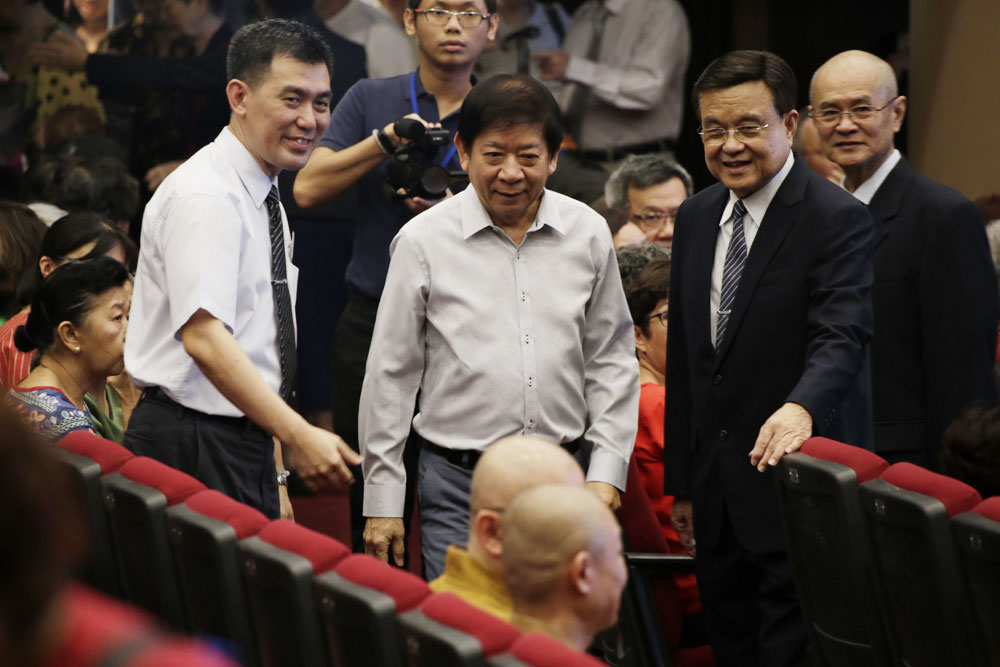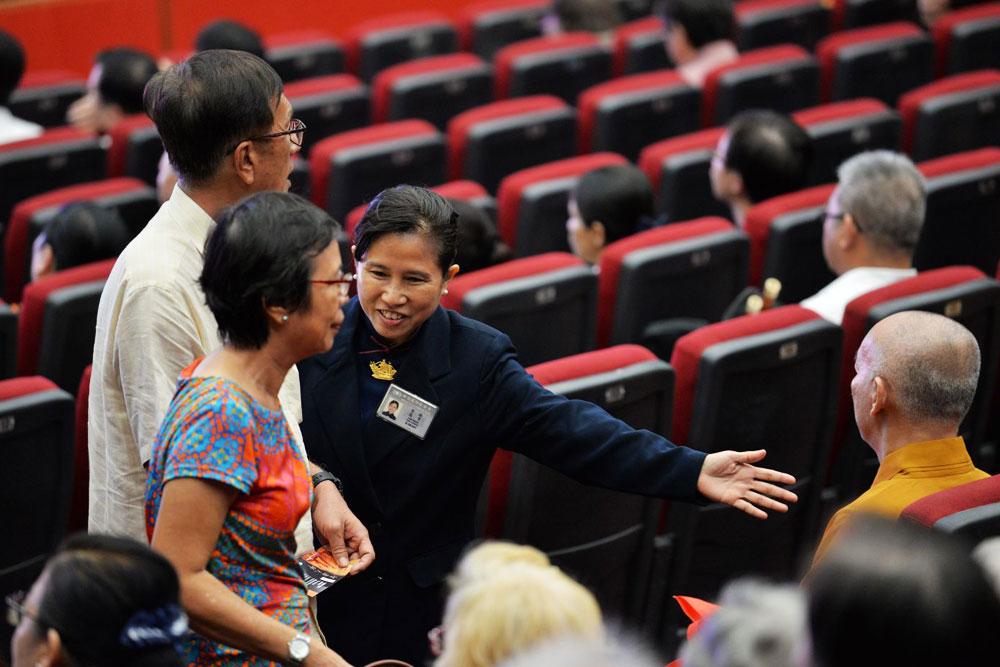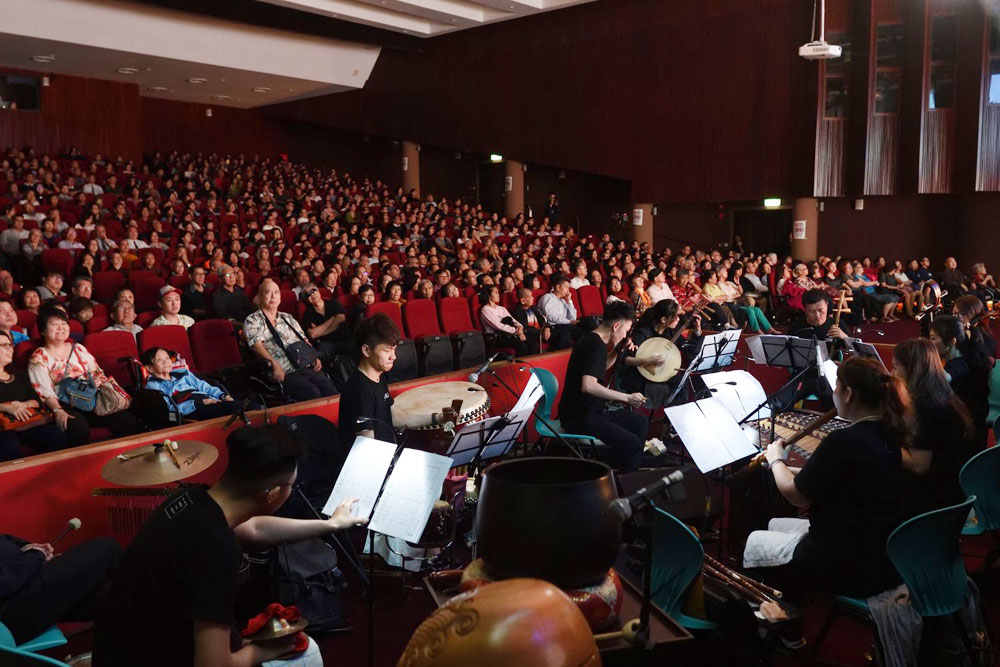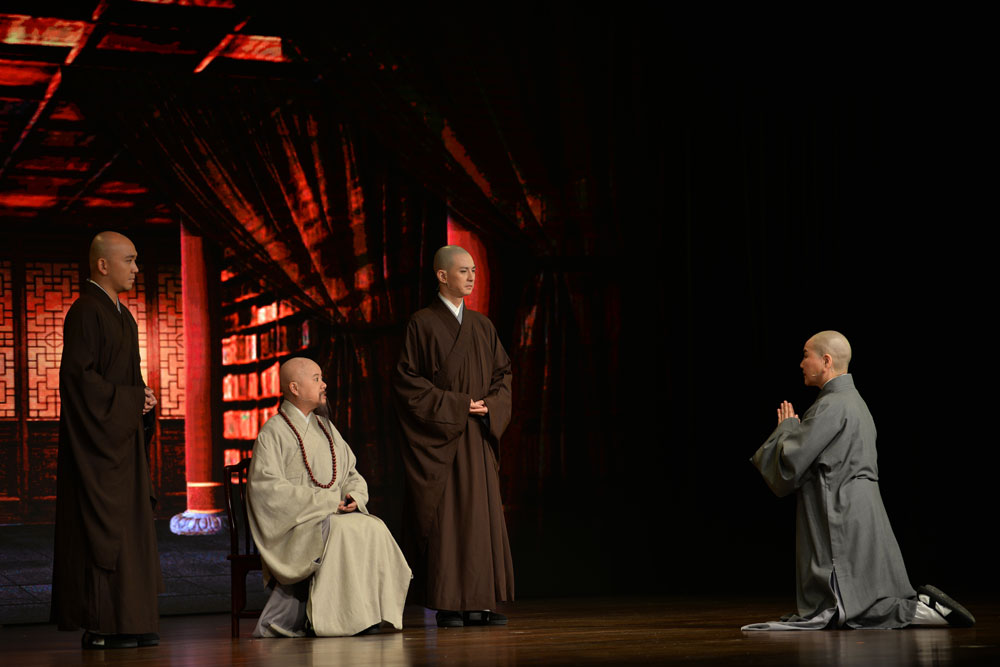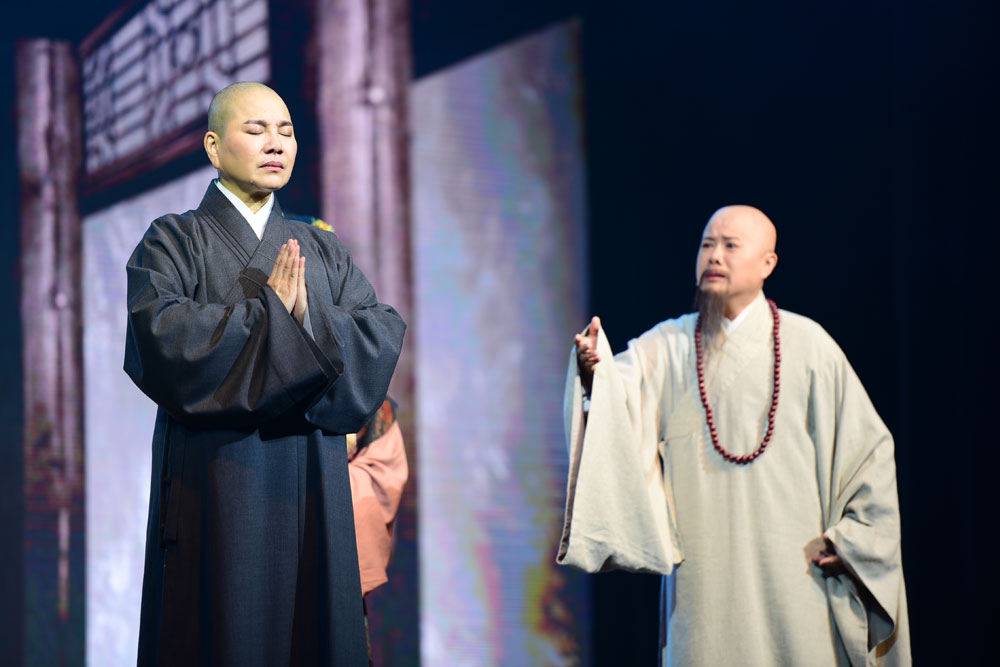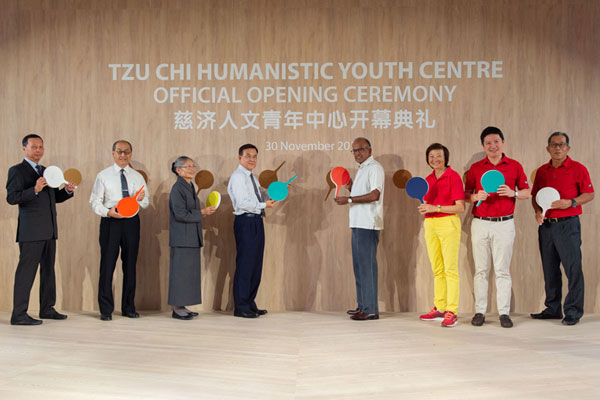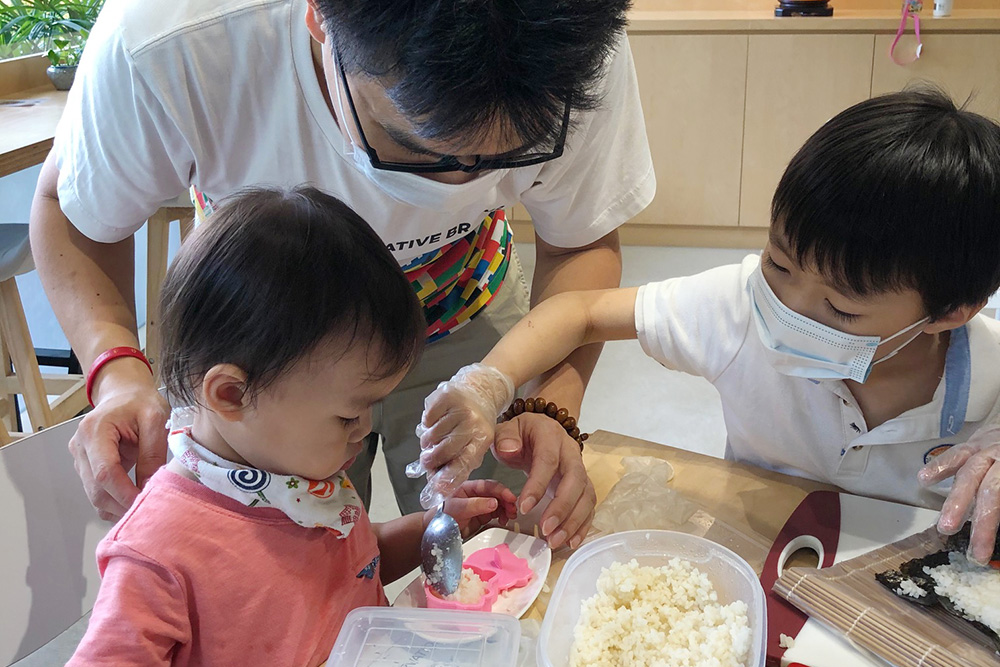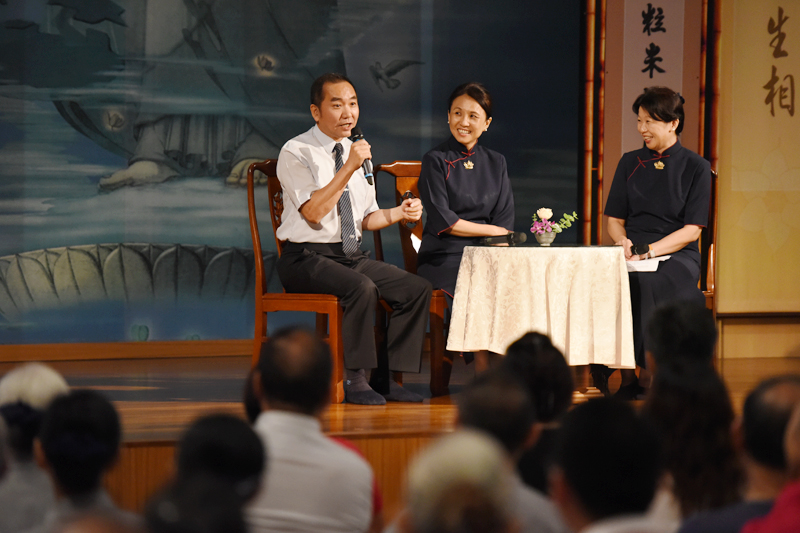 A scene from the “Great Dharma Master Zhizhe” Charity Performance, the first of its kind in the world. (Photo by Lai Tong Heng)
A scene from the “Great Dharma Master Zhizhe” Charity Performance, the first of its kind in the world. (Photo by Lai Tong Heng)
Dharma Master Zhizhe, also known as Zhi Yi, was an eminent monk who lived during the Northern and Southern dynasties, a tumultuous era in ancient China that was plagued with civil wars and political chaos.
With an unwavering faith and determination to propagate the Dharma, Master Zhizhe painstakingly classified the various Buddhist sutras into the “Five Periods and Eight Teachings”, and established widely studied Buddhist concepts, such as “Three Thousand Realms in a Single Moment of Thought”, “Perfect Harmony of the Three Truths”, etc. He was also the founder of the Tiantian tradition, the first native school of Buddhism in China.
On 5th and 6th July, 2019, Tzu Chi Foundation (Singapore) held three sessions of the “Great Dharma Master Zhizhe” Charity Performance at Kreta Ayer People’s Theatre. Staged by the renown Tang Mei Yun Taiwanese Opera Company, with the lead character passionately portrayed by Tang, the event drew close to 2,300 attendees. All the ticket proceeds were channeled to the Foundation’s Charity Development Fund.
Vow to walk the path of Buddhism and break free from the cycle of rebirth
The first scene brought the audience back to the tumultuous era of the Northern and Southern dynasties in ancient China over 1,400 years ago. Amid the chaos of a civil war, 17-year-old Chen De An (Dharma Master Zhizhe as a youth) faced the imminent threat of his family being torn apart by the war.
As he was fleeing from the battles, moving from one place to another, he met an anonymous monk, who kindly gave a bun (that he had received from a devotee) to a poor, old and hungry lady. Highly impressed, he asked the monk why he did not seem to be affected by the chaos of the war.
The monk calmly replied, “I’m also ‘escaping from suffering’. You all are escaping from the enemy soldiers, but I’m escaping from the suffering of the cycle of rebirth.”
These words struck a deep chord with the youth, and a thought arose in him: “Since I’ve experienced unspeakable suffering from a war-torn nation, I should all the more not trap myself in the cycle of rebirth.”
Thus, one day, he knelt before the Buddha statue in a temple and made a vow to enter the Buddhist monastic order.
At the age of 18, Dharma Master Zhizhe was ordained as a monk, and subsequently learned the monastic precepts from Dharma Master Hui Kuang. When he turned 23, he went to seek Chan Master Hui Si for guidance and instruction under the recommendation of Master Hui Kuang.
Do not use the Dharma to gain favour from others. Do not be the last bearer of the Dharma.”
Audience member Ye Qing Ju, who has always been in touch with Tzu Chi and the Dharma, was deeply inspired by how Master Zhizhe chose to renounce worldly official titles to pursue the path of Buddhism.
She said that one who pursued an official title would still not escape from the suffering resulting from the fall of a nation, and that only when one practised the Buddhist path could one break free from the suffering of the cycle of rebirth and follow a truly eternal path. She added that she had worked very hard to earn a living, but it could not give her inner spiritual joy. Thus, she decided to delve into the Dharma and hoped to realise more of the teachings and overcome her inner afflictions.
The last reminder from Chan Master Hui Si to his disciple, Master Zhizhe, “Do not use the Dharma to gain favour from others. Do not be the last bearer of the Dharma” left a deep impression on Mr Kua Soon Khe, Chief Executive of the Singapore Buddhist Federation (pictured below, first from the left).
He noted that the work of passing on the Dharma or a tradition was often met with challenges due to changes in the society and environment. He was especially impressed and touched to see that there was such a great Dharma master as Zhizhe who worked unwaveringly to propagate the Dharma.
“We have advanced technology and abundant resources now, so we should not retreat (from learning the Dharma), and it is best to start teaching children the Dharma from a young age,” he commented.
 (Photo by Wong Twee Hee)
(Photo by Wong Twee Hee)
Tzu Chi Volunteer Lim Siew Cheng, who has been watching Dharma Master Cheng Yen’s early morning lectures for many years, was able to gain a deeper understanding and realisation after watching the opera performance.
Lim shared, “It is not easy to come into contact with the Dharma and listen to the teachings. It takes the steadfast spiritual aspirations of a noble monk in order for the true Dharma to be passed on to future generations. I saw how Master Zhizhe established the ‘Five Periods and Eight Teachings’. And also, I’ve learned about the need to practise bringing peace and joy through speech, actions and thoughts in the chapter of ‘Happy Dwelling Conduct’ from the Lotus Sutra. We must be mindful of our every intention in the present, because every single thought contains the infinite dharma realms."
Remaining firm in the face of inner demons
Master Zhizhe expounded the Dharma in many places, including the Waguan Temple, and his daily work became more arduous as the days went by. However, despite having many people coming to listen to his lectures on the Dharma, there were very few who truly attained enlightenment. In order to come out with a teaching system and school of thought that could be widely spread to the world, Master Zhizhe decided to enter a meditation retreat on Tiantai Mountain.
Like the Buddha, when Master Zhizhe’s spiritual cultivation reached a certain level or state, he faced a test from his inner demons. In our path of spiritual practice, our inner demons will test us at our most vulnerable moment, to let us know how far we are able to progress.
Many Dharma masters were invited to the charity performance. Among them was Dharma Master Fo Zhi, who hailed from Taiwan. He shared, “Master Zhizhe truly (had a hard time in his path of spiritual practice.) It was not easy for him at all. He had to face many tests from demons in the Saha world, and he could not forget about delivering sentient beings. He was just like Master Cheng Yen, who always puts all living beings as her first priority. Hence, we really have to be determined to cultivate spiritually."
On the stage, Master Zhizhe said with a sigh: “There are many people who came to listen to the Dharma, but only few have truly attained the teachings."
These words struck the deepest chord with Tzu Chi volunteer Wong Nyon Moi. She said, “I have listened to the Dharma talks by Master Cheng Yen for so long, but how many of her teachings have I truly understood? It seems like I (keep forgetting what I have heard).”
When Wong saw the scene where Master Zhizhe was battling the demons from within, she came to realise that the problems, stress or troubles in life were often self-imposed, so the “solution” actually lies in our own mind.

Master Zhizhe managed to conquer the demons within his mind when he recalled the teaching of his mentor, and remained firm in his chosen path. (Photo by Wong Twee Hee)
Spreading the Dharma through drama and music
Taiwanese opera is a popular traditional performance in Taiwan; it is also a well-received way to spread the Dharma there. However, such an art form is uncommon in highly modernized Singapore. In view of this, numerous efforts were made by Tzu Chi Singapore to promote the "Great Dharma Master Zhizhe” Charity Performance, such as holding book sharing sessions, related talks, etc.
Deputy Director of Tzu Chi Taiwan’s Da Ai TV Roger Hsiao, the scriptwriter of the opera, Zhuang Shih Hong, and also the lead actress, Tang Mei Yun were invited to the book sharing session to share with everyone the origin of the drama as well as the painstaking efforts of the production team behind-the-scenes.
"This is a very profound and insightful Taiwanese opera. Master Zhizhe was very determined and focused in seeking the Dharma and never gave up despite encountering a lot of tests and challenges,” shared Nick Shen, a former Mediacorp actor.
Shen came for the performance with his father. He appreciates the fact that many drama companies in Taiwan are adapting the Dharma into TV series in order to attract young people to learn about the teachings.
Tzu Chi volunteer Tan Woei Ren had previously thought that watching traditional Chinese operas was really boring. However, to his surprise, it turned out that the opera performance was really interesting. The part that captured Tan’s heart the most was where Master Zhizhe’s mentor told him not to be “the last bearer of the Dharma” i.e. not to let the Dharma die with him. These words made Tan feel very grateful for being able to walk on the path of Tzu Chi. He shared, “It is not enough to just do Tzu Chi’s work. We need to have the Dharma within us, too.”
The same scene was also deeply etched in the heart of Tzu Chi volunteer Lin Shuguo, spurring her to reflect on herself if she had done her part as a disciple of Dharma Master Cheng Yen to uphold the Jing Si Dharma lineage.
"Master Cheng Yen also bears her mentor’s teaching in her mind: to work for Buddhism and for all sentient beings, and she truly lives out the Lotus Sutra throughout her life. The late great Dharma masters of the past are very distant from us, while Master Cheng Yen is someone who is close to us now. So, we should cherish and appreciate her more,” said Lin.
The opera performance on the life of the great Dharma Master Zhizhe ended with a rousing applause from the audience. Tang Mei Yun, the head of the opera company, led the troupe members and extras to thank the audience for their support.
Expounding and spreading the Dharma through such a drama performance is how the Dharma can be passed on from generation to generation, ensuring that the Buddha’s teachings live forever.
 A Jing Si booth is set up outside the theater to promote publications on the teachings of Dharma Master Cheng Yen. (Photo by Pua Poo Toong)
A Jing Si booth is set up outside the theater to promote publications on the teachings of Dharma Master Cheng Yen. (Photo by Pua Poo Toong)

The opera performance is also attended by 45 Tzu Chi volunteers from Batam, Indonesia. Volunteer Wang Li Fen (middle) really admires Master Zhizhe’s faith and determination in propagating the Dharma. (Photo by Fong Kwai Kin)

